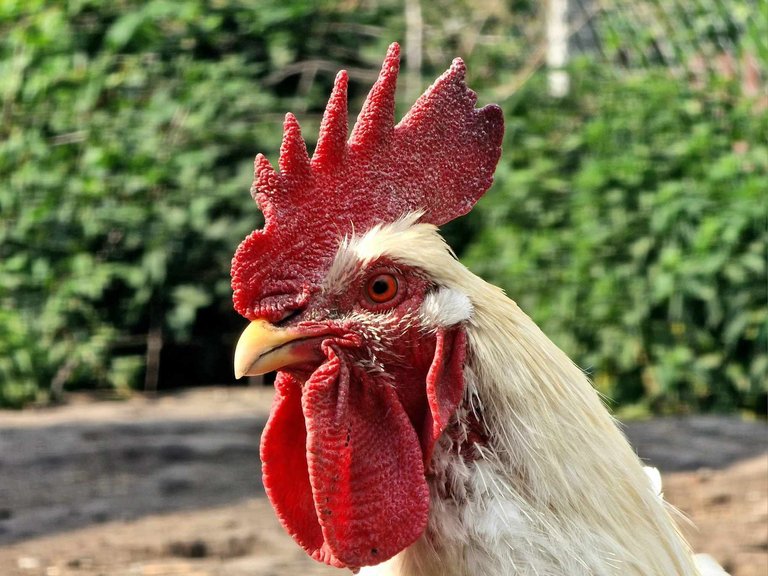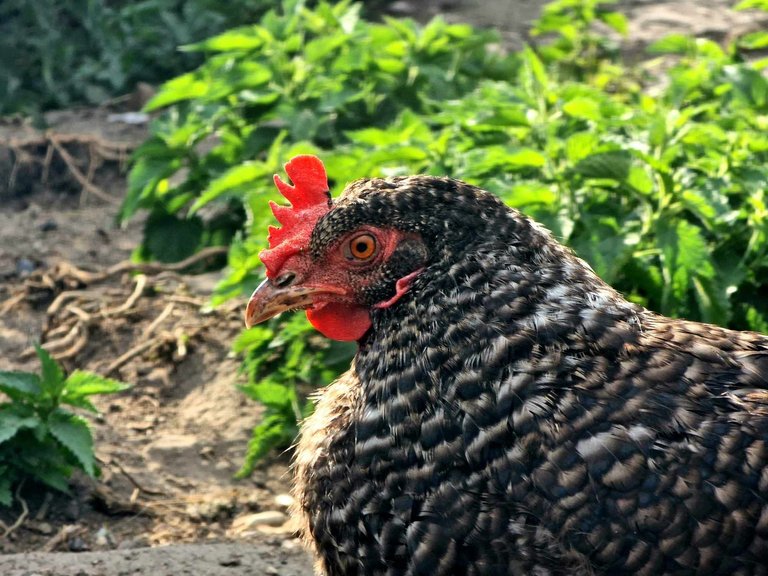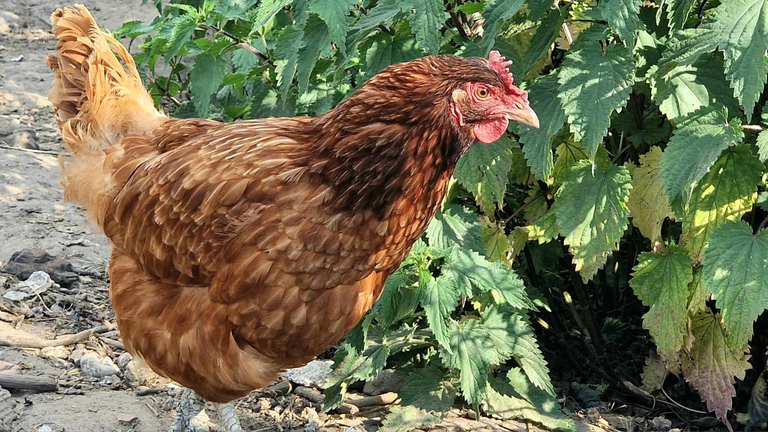In my region, I see the growing popularity of backyard chicken coops for personal use. This is an interesting solution that affects the quality of the eggs we eat and the quality of life of the hens. After all, a backyard chicken coop makes farms lose customers. However, I believe that own chicken coop is not always a good decision. Hens are animals like any other. It is necessary to take care of them and provide the best possible conditions. Building our own chicken coop adds several responsibilities that need to be repeated day in and day out. It must be a conscious and responsible decision. Better quality eggs can be obtained in other ways, for example, by getting in touch with a local farmer. Anyway, in this post I would like to show you what to pay attention to when building your own chicken coop.

By the way, this is my entry into smap contest. Pictured here is my beautifully grown rooster
The basic requirements are:
- Access to feed
- Access to fresh water
- Access to a room and a place where the hens can lay eggs in peace
- Fencing
However, this is the tip of the iceberg. It is worth looking into other topics, namely:
1 Breed
Every breed is different. Some carry better, and some grow faster, but lay fewer eggs. When choosing a breed, you need to pay attention to the weather conditions in our location and the needs of the breed.
2 Chicken house
This is where I could write a book. It may seem that a chicken coop is a simple matter, but in reality it is not. Here we need to pay attention to:
- Good air circulation
- Ease of cleaning
- Material
- The right amount of space
- The right temperature
- Protection from predators
I would like to pay more attention to the material. Wooden chicken coops are popular, but there are several downsides. There are a lot of crevices where mites can develop, drinking chicken blood, this will require fighting with diatomaceous earth or preparations. It is quite tiring, in metal coops you can use a blowtorch to get rid of pests. This is the most effective and inexpensive method. I have also seen a solution that combines these features. That is, having two poultry houses. Mites like high temperatures (18 degrees Celsius and above), so the matter is simple. In the summer we use a metal coop, and when it gets colder we use a second heated one.
I will elaborate further on the subject of protection from predators. I am referring here also to birds. It is also worth investing in a net to protect the hens from attacks from the sky.
3 Veterinarian and deworming
I know some people don't do this, but it is a big mistake. Examining your hens is not just looking out for their welfare, but also for ours. After all, there could be salmonella in the eggs. It's a good idea to have our hens dewormed and examined once in a while.

4 Proper nutrition
Hens should eat as much natural products as possible. Their diet should be balanced and rich in vitamins. Poor nutrition will negatively affect the number of eggs laid. Each breed has slightly different food requirements. So let's not type “How to feed a hen?” into google, but add the breed there as well.
5 How to increase carrying capacity
Animals have feelings. So let's ensure our hens have no bad feelings. A hen will lay the most eggs when she is well fed and doesn't feel stressed. That's why I mentioned in point two about protection from predators. When attacked, the hens will feel threatened and the carrying capacity will drop drastically. Let's take care of the animals, their needs and their feelings, then they will surely repay us.
6 Diseases
First and foremost. Prevention is better than cure, so let's make sure the chicken coop is clean and the bedding is fresh. It's also a good idea to cover the walls with lime and make the chickens a bath with diatomite (diatomite) earth, sand and ash. Let's not wait for the disease to develop, when we see that something is wrong, we should look for information on the Internet, and the best way is to notify a specialist and learn from him.
7 What about the rooster?
A rooster is not required when raising your own hens. The rooster fertilizes the eggs, so he will be needed with only the reproduction process of the flock. In addition, it makes a bodyguard.
In the post I presented only basic information. It is always worthwhile to do some more research on the Internet. I believe that the best science is to learn from your own mistakes, but not in this case. After all, here we are dealing with a living animal that should not be held responsible for our mistakes, so the best advice would be “Gather as much information as possible before you take on this challenge.” I will be saying goodbye now, greetings to you and have a good day.
The photos are taken by me. And the knowledge comes from my head ;)

Wersja po Polsku
W moim regionie widzę rosnącą popularność przydomowych kurników na użytek własny. Jest to ciekawe rozwiązanie, które wpływa na jakość spożywanych przez nas jajek oraz na jakość życia kur. W końcu przydomowy kurnik sprawia, że fermy tracą klientów. Jednak uważam, iż własny kurnik nie zawsze jest dobrą decyzją. Kury, to zwierzęta jak każde inne. Trzeba o nie dbać i zapewnić jak najlepsze warunki. Budowa własnego kurnika dodaje nam kilka obowiązków, które trzeba powtarzać dzień w dzień. Musi być to świadoma i odpowiedzialna decyzja. Jajka lepszej jakości można zdobyć w inny sposób np. poprzez nawiązanie kontaktu z lokalnym rolnikiem. W każdym razie w tym poście chciałbym wam pokazać, na co zwrócić uwagę podczas budowy własnego kurnika.

Podstawowe wymogi to:
- Dostęp do paszy
- Dostęp do świeżej wody
- Dostęp do pomieszczenia oraz miejsca, w którym kury będą mogły spokojnie znosić jajka
- Ogrodzenie
Jest to jednak wierzchołek góry lodowej. Warto się zainteresować innymi tematami, a więc:
1 Rasa
Każda rasa jest inna. Niektóre lepiej się niosą, a niektóre szybciej rosną, ale składają mniej jaj. Przy wyborze rasy trzeba zwrócić uwagę na warunki pogodowe w naszej lokalizacji i potrzeby danej rasy.
2 Kurnik
Tutaj mógłbym napisać książkę. Może się wydawać, że kurnik to prosta sprawa, ale w rzeczywistości jest inaczej. Musimy tu zwrócić uwagę na:
- Dobrą cyrkulację powietrza
- Łatwość czyszczenia
- Materiał
- Odpowiednią ilość miejsca
- Odpowiednią temperaturę
- Ochrona przed drapieżnikami
Chciałbym zwrócić więcej uwagi na materiał. Popularne są kurniki drewniane, ale jest tu kilka minusów. Jest tu dużo szpar, gdzie mogą się rozwijać roztocza, pijące kurzą krew, będzie to wymagało walki z użyciem ziemi okrzemkowej lub preparatów. Jest to dosyć męczące, w kurnikach metalowych można użyć palnika, aby pozbyć się szkodników. Jest to najbardziej skuteczna i tania metoda. Widziałem też rozwiązanie, które łączy te cechy. Czyli posiadanie dwóch kurników. Roztocza lubią wysokie temperatury (od 18 stopni Celsjusza), więc sprawa jest prosta. W lecie korzystamy z kurnika metalowego, a gdy zrobi się zimnej z drugiego ogrzewanego.
Rozwinę jeszcze temat ochrony przed drapieżnikami. Chodzi mi tu także o ptaki. Warto zainwestować również w siatkę, która ochroni kury przed atakami z nieba.
3 Weterynarz oraz odrobaczanie
Wiem, że niektórzy tego nie robią, ale jest to wielki błąd. Badanie swoich kur nie jest dbaniem tylko o ich dobro, ale także o nasze. W końcu w jajkach może pojawić się salmonella. Warto Nasze kur odrobaczyć i przebadać raz na jakiś czas.
4 Odpowiednie odżywanie
Kury powinny spożywać jak najbardziej naturalne produkty. Ich dieta powinna być zbilansowana i bogata w witaminy. Złe odżywanie wpłynie negatywnie na ilość składanych jajek. Każda rasa ma trochę inne wymagania co do jedzenia. Więc nie wpisujmy w google "Jak karmić kurę?", tylko dodajmy tam jeszcze rasę.
5 Jak zwiększyć nośność
Zwierzęta mają uczucia. Więc zapewnijmy naszym kurom brak złych uczuć. Kura będzie znosiła najwięcej jajek, gdy będzie dobrze odżywiona i nie będzie czuła stresu. Dlatego wspomniałem w punkcie drugim o ochronie przed drapieżnikami. Po ataku kury będą czuły się zagrożone i nośność spadnie drastycznie. Dbajmy o zwierzęta, ich potrzeby oraz uczucia, wtedy na pewno nam się odpłacą.
6 Choroby
Po pierwsze i najważniejsze. Lepiej zapobiegać niż leczyć, a więc zadbajmy, aby kurnik był czysty, a ściółka świeża. Warto też pokryć ściany wapnem oraz zrobić kurczakom wannę z ziemią okrzemkową (diatomitem), piaskiem oraz popiołem. Nie czekajmy na rozwój choroby, gdy widzimy, że coś jest nie tak, to poszukajmy informacji w internecie, a najlepiej powiadomić specjalistę i uczyć się od niego.
7 A co z kogutem?
Kogut nie jest wymagany przy własnej hodowli kur. Kogut zapładnia jajka, więc będzie on potrzebny przy tylko przy procesie reprodukcji stada. Dodatkowo robi za ochroniarza.
W poście przedstawiłem tylko podstawowe informacje. Zawsze warto jeszcze poszperać w internecie. Uważam, że najlepszą nauką jest nauka na własnych błędach, ale nie w tym przypadku. W końcu mamy tu kontakt z żywym zwierzęciem, które nie powinno ponosić odpowiedzialności za nasze błędy, więc najlepszą radą będzie "Zbierz jak najwięcej informacji zanim podejmiesz się tego wyzwania". Ja się będę już żegnał, pozdrawiam was i życzę wam miłego dnia.

@tipu curate 3
Upvoted 👌 (Mana: 45/75) Liquid rewards.
Dzięki wielkie :)
What you say is very true, a chicken coop at home requires a lot of sacrifice and dedication, the points you have touched on are excellent.
Have a great dayHow are you dear friend @matthew1 good morning
I'm good and happy, and you?
I wrote the post from the perspective of what is not visible at first glance on the Internet. I've had the farm for a while and I think this is useful knowledge.
Cheers!!!
Greetings @matthew1 ,
What a lovely, well-written post.
There is loads of work involved, its true..however if you appreciate the antics of chickens and their fresh eggs...it is an excellent trade-off.
All the best.
Cheers!
Greetings @bleujay
The chickens pay off very well. I have fresh eggs and buy more hens all the time. I already have several regular customers :)
Wish you good day!
Hello matthew1!
It's nice to let you know that your article will take 9th place.
Your post is among 15 Bestszejq articles voted 7 days ago by the @hive-lu | King Lucoin Curator by
You receive 🎖 0.6 unique LUBEST tokens as a reward. You can support Lu world and your curator, then he and you will receive 10x more of the winning token. There is a buyout offer waiting for him on the stock exchange. All you need to do is reblog Daily Report 314 with your winnings.
Buy Lu on the Hive-Engine exchange | World of Lu created by szejq (Lucoin) and get paid. With 50 Lu in your wallet, you also become the curator of the @hive-lu which follows your upvote.
STOPor to resume write a wordSTART